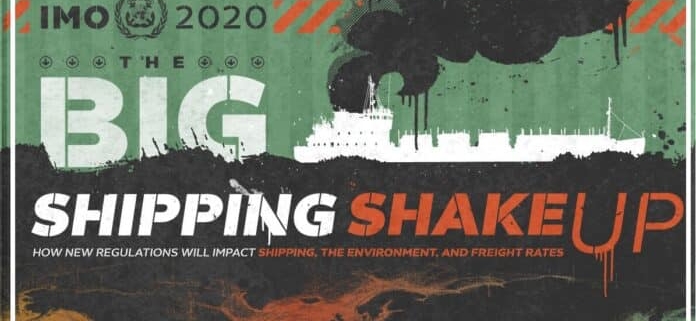Stephen Andrew statement on IMO 2020 and the Great Shipping Reset
In California, there are now a record-breaking 65 cargo ships anchored off the state’s two biggest ports, awaiting entry. Many have been there for weeks. Similar scenes are being played out at key ports around the world as the global supply chain slowly disintegrates. What is going on?
The most popular explanations given, include covid-restrictions, crew-change problems and a worldwide shortage of containers. Then there are the driver shortages, hurricanes, industrial disputes, port inefficiencies, price-gouging and an ‘online spending frenzy’ – take your pick.
What is never mentioned, however, is IMO 2020, the UN’s new ‘climate change’ regulation, which took effect on 1 January 2020. IMO 2020 was a new regulatory system intended to lay the groundwork for a ‘phase in’ of carbon taxing ships by 2023, and the transition to ‘net zero shipping’ by 2050.
The new regulation banned ships from using the old, cheap ‘bunker fuel’ and forced them to either use much more expensive fuels or install space-wasting ‘scrubber’ technology on their ships. Both options came with huge operational costs for carriers.
IMO 2020 also imposed more onerous port inspection and reporting obligations, which many feared would lead to congestion, delays and blank sailings.
According to Maersk, 60% of a carrier’s costs are FUEL.
Any transition away from cheap fuel, therefore, was always going to cause shipping costs to skyrocket, and then ripple its way down the supply chain. It is odd, therefore, that not a single shipping expert even refers to IMO 2020 when discussing the current crisis. I mean it was ALL anyone in the industry could talk about in 2019!
“IMO 2020 WILL BE THE LARGEST, MOST DISRUPTIVE REGULATION, TO IMPACT GLOBAL SHIPPING IN MODERN HISTORY” one analyst said.
Goldman Sachs, meanwhile, estimated that the total impact of IMO 2020 to “consumer wallets could be around $US240 billion”. Others warned that ships would start “slow steaming” to offset fuel costs, especially on longer routes – IN FACT THE WORLD’S CLIMATE CHANGE ZEALOTS SAID THEY WERE COUNTING ON IT.
But something else happened in January 2020, that served to completely mask the impacts of IMO 2020 –Covid-19. Once oil prices and cargo flows started to recover, however, suddenly we were seeing sky-high freight rates, port congestion and shipping delays. Everything, in fact, that the experts had predicted would happen once IMO 2020 took effect. And yet, weirdly, all that is now forgotten.
Are they worried that if they mention it, people might get the ‘crazy’ idea that maybe -just maybe – it wasn’t Covid, hurricanes or lost containers that crippled the global shipping industry, but rather the world’s governing elites themselves?




Leave a Reply
Want to join the discussion?Feel free to contribute!